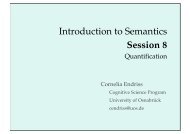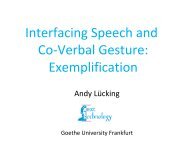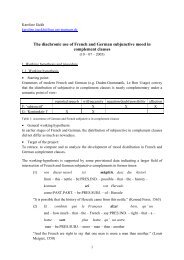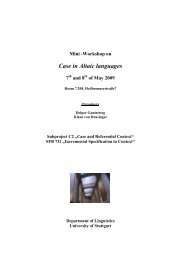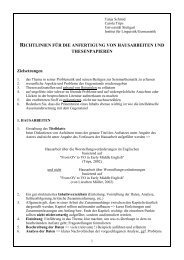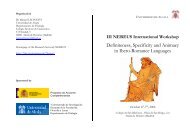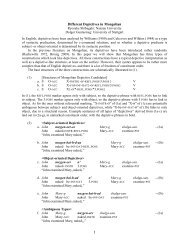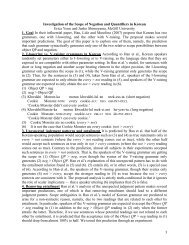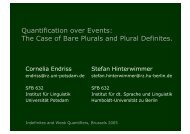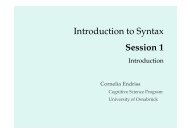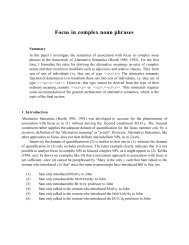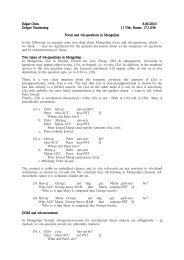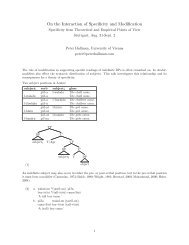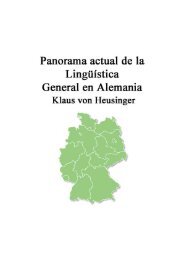- Page 1 and 2: EXISTENCE: SEMANTICS AND SYNTAX
- Page 3 and 4: EXISTENCE: SEMANTICS AND SYNTAX edi
- Page 5: TABLE OF CONTENTS Preface vii Ilean
- Page 9 and 10: ILEANA COMOROVSKI AND KLAUS VON HEU
- Page 11 and 12: INTRODUCTION 3 c. Edinstvennyj, kto
- Page 13 and 14: INTRODUCTION 5 (4) a. Studenty ne b
- Page 15: INTRODUCTION 7 ilar to the indirect
- Page 19: PART I THE INTERPRETATION OF THE CO
- Page 22 and 23: 14 RONNIE CANN f. What I want is a
- Page 24 and 25: 16 RONNIE CANN to constructions inv
- Page 26 and 27: 18 RONNIE CANN (12) There’s the C
- Page 28 and 29: 20 RONNIE CANN (15) a. Neuroses jus
- Page 30 and 31: 22 RONNIE CANN ?Ty(t) ↦→ ?Ty(t)
- Page 32 and 33: 24 RONNIE CANN to construct a formu
- Page 34 and 35: 26 RONNIE CANN which at least one l
- Page 36 and 37: 28 RONNIE CANN (20) a. ??Many types
- Page 38 and 39: 30 RONNIE CANN Tn(n),Ty(e),Fo(U), ?
- Page 40 and 41: 32 RONNIE CANN starting point the a
- Page 42 and 43: 34 RONNIE CANN subject node, yields
- Page 44 and 45: 36 RONNIE CANN ?Ty(t) Fo(Mary ′ )
- Page 46 and 47: 38 RONNIE CANN ?Ty(t) ↦→ Ty(t),
- Page 48 and 49: 40 RONNIE CANN ?Ty(t), ♦ Ty(e),Fo
- Page 50 and 51: 42 RONNIE CANN There remains in thi
- Page 52 and 53: 44 RONNIE CANN (36) a. LOC(Mary ′
- Page 54 and 55: 46 RONNIE CANN Although I do not he
- Page 56 and 57: 48 RONNIE CANN McNally, L. (1998) E
- Page 58 and 59: 50 ILEANA COMOROVSKI While the dist
- Page 60 and 61: 52 ILEANA COMOROVSKI (7) Quelle dev
- Page 62 and 63: 54 ILEANA COMOROVSKI we have review
- Page 64 and 65: 56 ILEANA COMOROVSKI First, as we h
- Page 66 and 67:
58 ILEANA COMOROVSKI To decide on t
- Page 68 and 69:
60 ILEANA COMOROVSKI g. ∗ Quel es
- Page 70 and 71:
62 ILEANA COMOROVSKI ‘last’,
- Page 72 and 73:
64 ILEANA COMOROVSKI (35) a. Quelle
- Page 74 and 75:
66 ILEANA COMOROVSKI Note that the
- Page 76 and 77:
68 ILEANA COMOROVSKI the generic op
- Page 78 and 79:
70 ILEANA COMOROVSKI tag-question t
- Page 80 and 81:
72 ILEANA COMOROVSKI 4.2. The Defin
- Page 82 and 83:
74 ILEANA COMOROVSKI the topic of c
- Page 84 and 85:
76 ILEANA COMOROVSKI Romanian non-D
- Page 87 and 88:
LJUDMILA GEIST PREDICATION AND EQUA
- Page 89 and 90:
PREDICATION AND EQUATION IN COPULAR
- Page 91 and 92:
PREDICATION AND EQUATION IN COPULAR
- Page 93 and 94:
PREDICATION AND EQUATION IN COPULAR
- Page 95 and 96:
PREDICATION AND EQUATION IN COPULAR
- Page 97 and 98:
PREDICATION AND EQUATION IN COPULAR
- Page 99 and 100:
PREDICATION AND EQUATION IN COPULAR
- Page 101 and 102:
PREDICATION AND EQUATION IN COPULAR
- Page 103 and 104:
PREDICATION AND EQUATION IN COPULAR
- Page 105 and 106:
PREDICATION AND EQUATION IN COPULAR
- Page 107 and 108:
PREDICATION AND EQUATION IN COPULAR
- Page 109 and 110:
PREDICATION AND EQUATION IN COPULAR
- Page 111 and 112:
PREDICATION AND EQUATION IN COPULAR
- Page 113:
PREDICATION AND EQUATION IN COPULAR
- Page 116 and 117:
108 CLAUDIA MAIENBORN statives - ha
- Page 118 and 119:
110 CLAUDIA MAIENBORN These propert
- Page 120 and 121:
112 CLAUDIA MAIENBORN (6) Manner ad
- Page 122 and 123:
114 CLAUDIA MAIENBORN The K-state a
- Page 124 and 125:
116 CLAUDIA MAIENBORN (16) a. Carol
- Page 126 and 127:
118 CLAUDIA MAIENBORN (17’) a. Jo
- Page 128 and 129:
120 CLAUDIA MAIENBORN why would the
- Page 130 and 131:
122 CLAUDIA MAIENBORN lavishly, etc
- Page 132 and 133:
124 CLAUDIA MAIENBORN Now, here is
- Page 134 and 135:
126 CLAUDIA MAIENBORN say that the
- Page 136 and 137:
128 CLAUDIA MAIENBORN In my view, s
- Page 138 and 139:
130 CLAUDIA MAIENBORN Montmarquet,
- Page 141 and 142:
JIANHUA HU AND HAIHUA PAN FOCUS AND
- Page 143 and 144:
FOCUS AND THE BASIC FUNCTION OF CHI
- Page 145 and 146:
FOCUS AND THE BASIC FUNCTION OF CHI
- Page 147 and 148:
FOCUS AND THE BASIC FUNCTION OF CHI
- Page 149 and 150:
FOCUS AND THE BASIC FUNCTION OF CHI
- Page 151 and 152:
FOCUS AND THE BASIC FUNCTION OF CHI
- Page 153:
FOCUS AND THE BASIC FUNCTION OF CHI
- Page 156 and 157:
148 BARBARA H. PARTEE AND VLADIMIR
- Page 158 and 159:
150 BARBARA H. PARTEE AND VLADIMIR
- Page 160 and 161:
152 BARBARA H. PARTEE AND VLADIMIR
- Page 162 and 163:
154 BARBARA H. PARTEE AND VLADIMIR
- Page 164 and 165:
156 BARBARA H. PARTEE AND VLADIMIR
- Page 166 and 167:
158 BARBARA H. PARTEE AND VLADIMIR
- Page 168 and 169:
160 BARBARA H. PARTEE AND VLADIMIR
- Page 170 and 171:
162 BARBARA H. PARTEE AND VLADIMIR
- Page 172 and 173:
164 BARBARA H. PARTEE AND VLADIMIR
- Page 174 and 175:
166 BARBARA H. PARTEE AND VLADIMIR
- Page 176 and 177:
168 BARBARA H. PARTEE AND VLADIMIR
- Page 178 and 179:
170 BARBARA H. PARTEE AND VLADIMIR
- Page 180 and 181:
172 BARBARA H. PARTEE AND VLADIMIR
- Page 182 and 183:
174 BARBARA H. PARTEE AND VLADIMIR
- Page 184 and 185:
176 BARBARA H. PARTEE AND VLADIMIR
- Page 186 and 187:
178 BARBARA H. PARTEE AND VLADIMIR
- Page 188 and 189:
180 BARBARA H. PARTEE AND VLADIMIR
- Page 190 and 191:
182 BARBARA H. PARTEE AND VLADIMIR
- Page 192 and 193:
184 BARBARA H. PARTEE AND VLADIMIR
- Page 194 and 195:
186 BARBARA H. PARTEE AND VLADIMIR
- Page 196 and 197:
188 BARBARA H. PARTEE AND VLADIMIR
- Page 198 and 199:
190 BARBARA H. PARTEE AND VLADIMIR
- Page 200 and 201:
192 LUCIA M. TOVENA temporal differ
- Page 202 and 203:
194 LUCIA M. TOVENA function that c
- Page 204 and 205:
196 LUCIA M. TOVENA (12) a. Non c
- Page 206 and 207:
198 LUCIA M. TOVENA is observed in
- Page 208 and 209:
200 LUCIA M. TOVENA (18) Dal Csm ne
- Page 210 and 211:
202 LUCIA M. TOVENA Before we proce
- Page 212 and 213:
204 LUCIA M. TOVENA In (Tovena 2003
- Page 214 and 215:
206 LUCIA M. TOVENA notion of inter
- Page 216 and 217:
208 LUCIA M. TOVENA Number variatio
- Page 218 and 219:
210 LUCIA M. TOVENA sentence agains
- Page 220 and 221:
212 LUCIA M. TOVENA us to take into
- Page 222 and 223:
214 LUCIA M. TOVENA However, it is
- Page 224 and 225:
216 LUCIA M. TOVENA this may be a p
- Page 226 and 227:
218 LUCIA M. TOVENA to two main typ
- Page 229:
PART III EXISTENCE AND THE INTERPRE
- Page 232 and 233:
224 FRANCIS CORBLIN (3) I quoted at
- Page 234 and 235:
226 FRANCIS CORBLIN This proposal t
- Page 236 and 237:
228 FRANCIS CORBLIN Although I am c
- Page 238 and 239:
230 FRANCIS CORBLIN 2.4. The Maxima
- Page 240 and 241:
232 FRANCIS CORBLIN reliable test e
- Page 242 and 243:
234 FRANCIS CORBLIN There is, I bel
- Page 244 and 245:
236 FRANCIS CORBLIN It can also be
- Page 246 and 247:
238 FRANCIS CORBLIN The interpretat
- Page 248 and 249:
240 FRANCIS CORBLIN 4.3. The Modifi
- Page 250 and 251:
242 FRANCIS CORBLIN For definite NP
- Page 252 and 253:
244 FRANCIS CORBLIN (59) X, x X={Pi
- Page 254 and 255:
246 FRANCIS CORBLIN The main point,
- Page 256 and 257:
248 FRANCIS CORBLIN 2) It builds th
- Page 258 and 259:
250 FRANCIS CORBLIN of comparison f
- Page 260 and 261:
252 FRANCIS CORBLIN Heim, I. (1982)
- Page 262 and 263:
254 BART GEURTS The incidence of in
- Page 264 and 265:
256 BART GEURTS that the assessment
- Page 266 and 267:
258 BART GEURTS 3. INTRODUCING PRES
- Page 268 and 269:
260 BART GEURTS noun phrase ‘Fred
- Page 270 and 271:
262 BART GEURTS been elaborated at
- Page 272 and 273:
264 BART GEURTS there is no local s
- Page 274 and 275:
266 BART GEURTS becomes infelicitou
- Page 276 and 277:
268 BART GEURTS The binding theory
- Page 278 and 279:
270 BART GEURTS be true that Barney
- Page 281 and 282:
KLAUS VON HEUSINGER REFERENTIALLY A
- Page 283 and 284:
REFERENTIALLY ANCHORED INDEFINITES
- Page 285 and 286:
REFERENTIALLY ANCHORED INDEFINITES
- Page 287 and 288:
REFERENTIALLY ANCHORED INDEFINITES
- Page 289 and 290:
REFERENTIALLY ANCHORED INDEFINITES
- Page 291 and 292:
REFERENTIALLY ANCHORED INDEFINITES
- Page 293 and 294:
REFERENTIALLY ANCHORED INDEFINITES
- Page 295 and 296:
REFERENTIALLY ANCHORED INDEFINITES
- Page 297 and 298:
REFERENTIALLY ANCHORED INDEFINITES
- Page 299 and 300:
REFERENTIALLY ANCHORED INDEFINITES
- Page 301 and 302:
ROBERTO ZAMPARELLI ON SINGULAR EXIS
- Page 303 and 304:
ON SINGULAR EXISTENTIAL QUANTIFIERS
- Page 305 and 306:
ON SINGULAR EXISTENTIAL QUANTIFIERS
- Page 307 and 308:
ON SINGULAR EXISTENTIAL QUANTIFIERS
- Page 309 and 310:
ON SINGULAR EXISTENTIAL QUANTIFIERS
- Page 311 and 312:
ON SINGULAR EXISTENTIAL QUANTIFIERS
- Page 313 and 314:
ON SINGULAR EXISTENTIAL QUANTIFIERS
- Page 315 and 316:
ON SINGULAR EXISTENTIAL QUANTIFIERS
- Page 317 and 318:
ON SINGULAR EXISTENTIAL QUANTIFIERS
- Page 319 and 320:
ON SINGULAR EXISTENTIAL QUANTIFIERS
- Page 321 and 322:
ON SINGULAR EXISTENTIAL QUANTIFIERS
- Page 323 and 324:
ON SINGULAR EXISTENTIAL QUANTIFIERS
- Page 325 and 326:
ON SINGULAR EXISTENTIAL QUANTIFIERS
- Page 327 and 328:
ON SINGULAR EXISTENTIAL QUANTIFIERS
- Page 329 and 330:
ON SINGULAR EXISTENTIAL QUANTIFIERS
- Page 331 and 332:
ON SINGULAR EXISTENTIAL QUANTIFIERS
- Page 333 and 334:
ON SINGULAR EXISTENTIAL QUANTIFIERS
- Page 335 and 336:
ON SINGULAR EXISTENTIAL QUANTIFIERS
- Page 337 and 338:
Index A adverbial modification 107,
- Page 339 and 340:
INDEX 331 L locative sentence 4-5,



